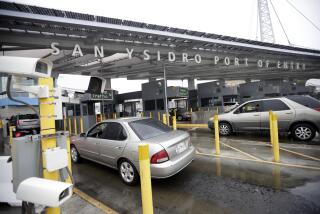Federal Jury Will Get George Case Today : Iran-Contra: Lawyers deliver final arguments. Prosecution calls him a cynical liar; defense sees a harried bureaucrat.
- Share via
WASHINGTON — A federal jury was asked Wednesday to decide whether retired CIA official Clair E. George was a cynical liar who sought to mislead Congress or a harried bureaucrat who was kept in the dark by his subordinates.
The conflicting portraits of George were presented by opposing lawyers as jurors prepared to deliberate the fate of the CIA’s former No. 3 executive, who is charged with nine counts of perjury and obstruction of federal investigators in the Iran-Contra scandal.
Jurors officially will receive the case this morning after instructions on the law from U.S. District Judge Royce C. Lambert.
Chief prosecutor Craig A. Gillen said in his closing argument that George knew the “dirty little secret” of clandestine arms sales to Iran and back-door U.S. support for Nicaragua’s Contras and deliberately lied to congressional committees about it in 1986.
The four-week trial, said Gillen, has shown “startlingly clear, unequivocal, unimpeachable, direct evidence” of George’s attempts at concealment.
With direct U.S. aid for the Nicaraguan rebels banned by Congress at the time and with then-President Ronald Reagan having pledged that there would be no arms-for-U.S. hostages deals with Iran, George’s motive for lying was to protect the agency and the Reagan Administration from congressional and public attack, Gillen told jurors.
However, defense attorney Richard A. Hibey argued that George “made honest mistakes” when he appeared before Senate and House investigating committees largely because information had been withheld from him by his principal subordinates. Hibey heaped special scorn on Alan D. Fiers, then chief of the CIA’s Central American Task Force and the government’s star witness against George.
Hibey called Fiers “a convicted liar” who had pointed an accusing finger at George “to make his own deal with the office of independent counsel,” which Gillen represents. Fiers pleaded guilty last year to two misdemeanor counts of withholding information from Congress and received a sentence of one year’s probation and 100 hours of community service.
Fiers falsely testified at George’s trial that he had many “one-on-one conversations” with George in which he mainly blamed George for deceiving Congress, Hibey charged. Yet Fiers gave inadequate briefings to George and often went over his head to deal directly with the late CIA director, William J. Casey, the attorney said.
“What comes out of Alan Fiers?” Hibey shouted at the jury. “It’s only what he wants to come out . . . so that he can obtain maximum benefit for himself and no one else. The man is not entitled to belief.”
Hibey pictured George as a harried spymaster who was in charge of more than 50 covert actions around the world but knew fewer details about the Iran-Contra project than did Fiers.
“And yet by virtue of his position, the man is charged with knowing everything,” Hibey said of his client.
Gillen, in his summation, said that George lied about the extent of his knowledge of the activities of then-White House aide Oliver L. North and North’s chief associate, former Air Force Maj. Gen. Richard V. Secord. But the prosecutor asked jurors to lay aside any political concerns about whether Reagan or the Democratic-controlled Congress were correct in their views about Nicaragua.
“This case is not about whether anyone supported Reagan Administration aid to the Contras or didn’t support it,” he said. “The essence of this case is, was the truth told? Congress needed truthful answers about what the CIA knew or didn’t know in order for Congress to do its job, much as you need the truth to do your job.”
George “lived in an environment where he thought he owned the secrets. He lived in a world where he thought he was the master,” Gillen said. “But this is a democracy. There is no place for that in the United States of America.”
Disputing Gillen, Hibey charged that George was “badly set up” by an angry Congress that had a political bias against the White House. He said that others in the Administration allowed George “to take the lance that was hurled at the agency.”
Hibey added: “Admittedly, he did not volunteer any more information than Congress already knew, but he was under no legal obligation to do so. As a 30-year veteran, he was trying to protect the CIA, not because the CIA was doing anything wrong but because the agency had to continue doing its work.”
More to Read
Sign up for Essential California
The most important California stories and recommendations in your inbox every morning.
You may occasionally receive promotional content from the Los Angeles Times.













